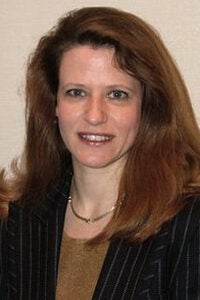
In early March at Harvard Law School, Lesley Rosenthal ’89, author of the new book “Good Counsel: Meeting the Legal Needs of Nonprofits,” discussed the career path that has led her to be vice president, general counsel and secretary of Lincoln Center for the Performing Arts in New York City. She also encouraged students to think about a future in non-profit law.
To get at some of the issues she deals with, she showed a brief video used to raise funds for the recent redevelopment of Lincoln Center, a $1.2 billion project in which she was closely involved. The 90-second film depicted the assets of Lincoln Center, including the prominent Lincoln Center sign (and corresponding trademark), information displays and roof lawn. Rosenthal discussed lawyering related to these assets, from property redevelopment negotiations and work on liability issues to negotiating with donors.
“I like to think that I’m working with artists — [but] it’s primarily not entertainment law,” Rosenthal said. “Probably less than 15 percent [of my work] has to do directly with arts legal topics. Instead I’m stewarding the legal function of a 16 acre complex on the Upper West Side and helping run a large and highly visible enterprise.”
A graduate of both Harvard College and Harvard Law School, Rosenthal reflected on the path that led her to Lincoln Center. She took some initial steps she recalls when she provided pro bono legal counsel to a dance company, during her 13-year tenure working in private practice as a business, litigation and technology lawyer at Paul, Weiss in New York City.
She had come to law school intending to go directly into public interest law full time. The judge she clerked for, Hon. Shirley Wohl Kram (United States District Judge for the Southern District of New York) strongly recommended that she get some experience in private practice first. “I thought, if I have to go to a law firm, I would go to one that would permit me to do substantial pro bono work in addition to my billable matters.”
During her talk, Rosenthal “busted a few myths” about non-profit law. She emphasized that from an in-house perspective, the lawyer is often not looking for the pluperfect legal analysis, but the most practical answer that fits within the law.
She also explained the distinction between non-profit and for-profit — the difference is not whether the organization makes a profit (excess revenues over expense), but rather what it does with the excess profit. Non-profit organizations plow back the excess into the organization, for further fulfillment of their mission, instead of paying it out to shareholders as dividends, she said.
She also contrasted work in private practice with in-house work. “Being in private practice really helped me understand niceties of legal language and concepts. In house, I’m more connected to the business of the organization… On the other hand, just because we’re tax exempt doesn’t mean that we’re law exempt!”